
Clupeiformes is the order of ray-finned fish that includes the herring family, Clupeidae, and the anchovy family, Engraulidae. The group includes many of the most important forage and food fish.
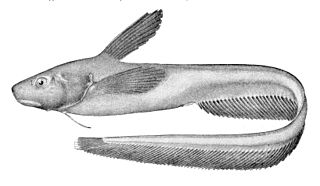
The jellynose fishes or tadpole fishes are the small order Ateleopodiformes. This group of ray-finned fish is monotypic, containing a single family Ateleopodidae. It has about a dozen species in four genera, but these enigmatic fishes are in need of taxonomic revision.
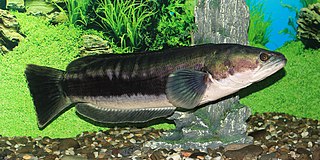
Channa is a genus of predatory fish in the family Channidae, commonly known as snakeheads, native to freshwater habitats in Asia. This genus contains about 50 scientifically described species. The genus has a wide natural distribution extending from Iraq in the west, to Indonesia and China in the east, and parts of Siberia in the Far East. A particularly high richness of species exists in Myanmar (Burma) and northeastern India, and many Channa species live nowhere else. In contrast, a few widespread species have been introduced to several regions outside their natural range, where they often become invasive. The large and medium-sized Channa species are among the most common staple food fish in several Asian countries, and they are extensively cultured. Apart from their importance as a food fish, snakeheads are consumed in some regions as a traditional medicine for wound healing and reducing postoperative pain and discomfort, and collected for the international aquarium pet trade.
Tariqilabeo is a genus of fish in the family Cyprinidae native to Asia.

Chromis is a genus of fish in the family Pomacentridae. While the term damselfish describes a group of marine fish including more than one genus, Chromis is the largest genus of damselfishes. Certain species within the genus are common in the aquarium trade.

Gymnothorax is a genus of fish in the family Muraenidae found in Atlantic, Indian, and Pacific Oceans. With more than 120 species, it the most speciose genus of moray eels.

Scorpaenodes is a widespread genus of marine ray-finned fish belonging to the family Scorpaenidae, the scorpionfishes. The fishes in this genus are found to the Atlantic, Indian and Pacific Ocean.
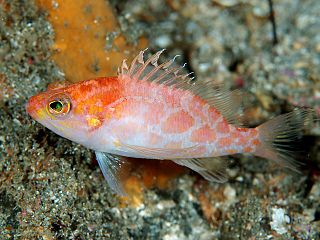
Plectranthias is a genus of ray-finned fish in the subfamily Anthiinae, part of the family Serranidae, the groupers and sea basses. They are found in the Atlantic, Indian and Pacific Ocean.

Mystus is a genus of fish in the family Bagridae native to Asia. Phylogenetic relationships within this genus are poorly understood, though it has been suggested that there are two major lineages.
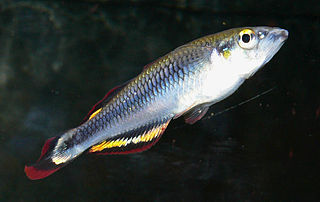
Bedotia is a genus of the family Bedotiidae of fishes endemic to Madagascar.
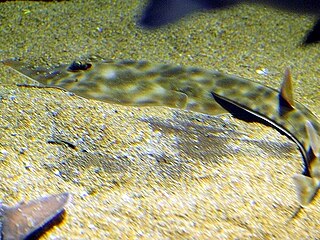
The brown guitarfish is a species of fish in the Rhinobatidae family. It is found in western Pacific of Taiwan and the Philippines. Its natural habitats are open seas, shallow seas, coral reefs, and estuarine waters. The Taiwan guitarfish was formerly considered a distinct species, but is now considered a junior synonym.
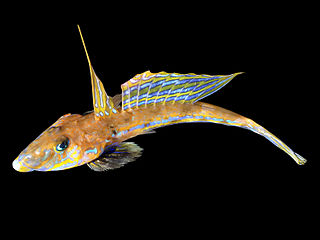
Callionymus is a genus of dragonets found mostly in the Indian and Pacific oceans with a few species occurring in the Atlantic Ocean.
Rhyacoschistura suber is a species of ray-finned fish, a stone loach, in the genus Rhyacoschistura. This species was originally described from three specimens collected among leaf litter in very shallow water in a small forest creek in the Nam Leuk drainage basin in Laos in 1997. These specimens were revealed to be juveniles and the species was re-described in 2019 on the basis of adult specimens. Based on the re-description, the species was moved from Schistura to the newly described genus, Rhyacoschistura.
Parateleopus is a genus of jellynose fish in the family Ateleopodidae. There are two recognized species:

Pethia is a genus of small freshwater fish in the family Cyprinidae native to South Asia, East Asia and Mainland Southeast Asia. Some species are commonly seen in the aquarium trade. The name Pethia is derived from the Sinhalese "pethia", a generic word used to describe any of several small species of cyprinid fishes. Most members of this genus were included in Puntius, until it was revised in 2012.

Minous, is a genus of marine ray-finned fishes, it is the only genus in the tribe Minoini, one of the three tribes which are classified within the subfamily Synanceiinae within the family Scorpaenidae, the scorpionfishes and their relatives. They are commonly known as stingfishes. They are found in the Indo-West Pacific.

Pristipomoides is a genus of marine ray-finned fish belonging to the family Lutjanidae, the snappers. They are found in the Atlantic, Indian and Pacific oceans.

Nemipterus is a genus of marine ray-finned fishes belonging to the family Nemipteridae, the threadfin and whiptail breams. These fishes are found in the Indian and Pacific Oceans, but now also occur in the Mediterranean Sea due to Lessepsian migration.
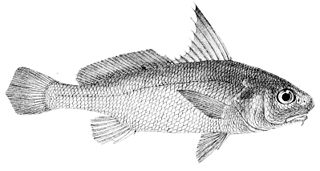
Johnius is a genus of marine ray-finned fishes belonging to the family Sciaenidae, the drums and croakers. They are commonly known as croakers due to their ability to produce purring, croaking and knocking sounds. The sounds are produced mainly at night and are thought to be either involved in defense or for courtship.
















